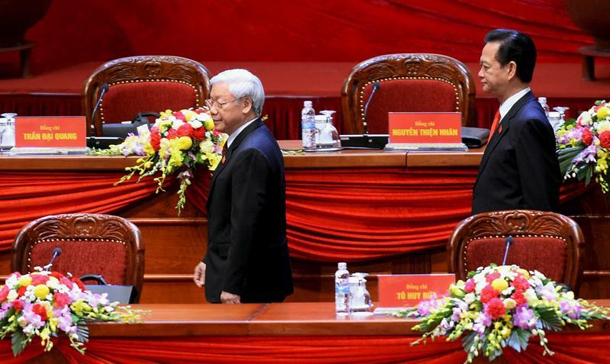HANOI — Supporters of Vietnam’s prime minister have nominated him for a key Communist Party panel, a necessary step to contesting the post of the party chief, in a last-minute maneuver to secure the top job in the country.
Delegates at a Communist Party congress nominated Prime Minister Nguyen Tan Dung to the Central Committee in what amounts to open defiance of the party chief, General Secretary Nguyen Phu Trong, who for years has been trying to sideline Dung.
His nomination was announced by Vu Ngoc Hoang, a Central Committee member and deputy chair of the party’s propaganda and education commission, state-run newspaper Tuoi Tre reported Sunday.
The move, while not completely unexpected, exposed the deep division between Trong and Dung. It was all the more striking as it was revealed during the ongoing party congress to choose the new general secretary and other leaders in the Politburo, the collective leadership that will govern Vietnam for the next five years.
Dung is favored by the business community, which feels that he will continue the economic reforms in the country at the same pace that have helped Vietnam attract a flood of foreign investment and helped triple the per capita GDP to US$2,100 over the past 10 years.
He is also seen as being more solid in standing up to neighboring China, which has been displaying aggressive territorial ambitions in the South China Sea.
Trong on the other hand is a stolid, conservative party apparatchik who is not seen as being too imaginative on economic reforms, and being too soft on China.
Before the congress opened on Thursday, it appeared that Trong had suppressed Dung by keeping him out of the official list of candidates for the new Central Committee, a key panel that will elect the Politburo. He also invoked a rule that prohibits the 175 members of the committee, where Dung has influence, from nominating anyone else.
However, Dung appears to have found a loophole in that rule by getting some of the 1,510 delegates attending the congress to nominate him, which is allowed.
Hoang was quoted by Tuoi Tre newspaper as saying that Dung and 61 others were nominated by the delegates for Central Committee positions. These names were not on the official list, and the development means that the congress will now have to vote on the final candidates.
Dung is obliged to refuse to accept the nomination, but the delegates are allowed to reject his refusal. If they do so on Monday, Dung would be in the running for the general secretary’s post along with Trong. The Central Committee will also nominate other key posts, including prime minister, which is the No. 2 in the hierarchy, the president and the chairman of the National Assembly, or the parliament.
Dung has been prime minister for two terms, and the only job open for him would be the No. 1 post. Trong’s camp accuses him of economic mismanagement, a prime example of which was the bankruptcy of a state-owned shipping company, failing to control massive public debt, corruption and non-preforming loans of state-owned banks.
Vietnam is one of the last remaining communist nations in the world, with a party membership of 4.5 million. But like its ideological ally China, the government believes in quasi-free market economy alongside a strictly controlled society that places several restrictions on its 93 million people.

















